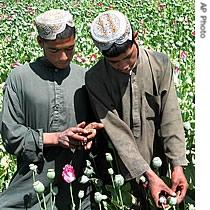2007年VOA标准英语-US Unveils New Counter-Drug Strategy for Afghan
搜索关注在线英语听力室公众号:tingroom,领取免费英语资料大礼包。
(单词翻译)
By David GollustState Department
09 August 2007
The United States Thursday announced a new, more aggressive, strategy for curbing2 the illicit3 drug trade in Afghanistan. U.S. officials concede that opium4 poppy production in the country overall is growing but say there have been local successes. VOA's David Gollust reports from the State Department.
 |
| Young Afghan farmers gather poppies in their field in Zadi Dusht district of Kandahar, Afghanistan (File photo) |
Afghanistan now produces about 90 percent of the world's illicit heroin7 derived8 from poppies. Officials here acknowledge that poppy cultivation overall is on the increase, mainly in Helmand and other southern provinces where the Taleban insurgency9 is strongest.
However, they say the opposite is true in the more secure northern region, and that six provinces of the country can already be considered poppy-free.
The new strategy aims at reinforcing the gains by speeding aid deliveries to localities making progress against the drug trade.
There would be greater coordination of counter-narcotics10 and counter-Taleban operations in the south with more action, including crop eradication11, directed against high-level drug traffickers who often work in concert with insurgents12.
| Thomas Schweich (2006 photo) |
"They need to understand that there is a direct relationship between the insecurity and the success or failure of the insurgency and the opium trade," he said. "There is increasing and more and more alarming intelligence about more integrated relationships between narco-traffickers and insurgents and Taleban."
"And for that reason, we need to make it clear that if you are supporting the poppy trade in the south of Afghanistan, you are supporting insecurity and you are supporting the Taleban," he continued.
The controversial practice of crop eradication would remain part of the strategy, though U.S. officials acknowledge differences with Britain, which has played the lead role in Afghan anti-drug efforts, over the use of aerial spraying.
U.S. Director of National Drug Control Policy John Walters said past eradication efforts had generated public anger, with small farmers feeling targeted while big growers with political connections were spared. He said coercive measures in the new strategy would be aimed against major offenders14 and corrupt15 officials.
"The opium poppy is a volcano, whose lava16 feeds corruption," said Walters. "It creates an incentive17 for people to be compromised."
"It has to be closed off. But part of it is not just to go after the farmer, obviously. But most of these parts address the leadership, address the institutional structures and making them stronger, but also going after the people who are making the big money. The big money made off of opium in Afghanistan is made by the upper levels of the chain: the warlords, the traffickers, the corrupt individuals who are involved in this."
The officials admitted there is no substitute crop that would be as lucrative18 for Afghan farmers as poppy. But they said ending poppy cultivation would bring farmers ancillary19 benefits including greater peace and security as drug lords and criminals are uprooted20.
The new strategy would only modestly increase U.S. anti-drug aid to Afghanistan, now about $600 million a year. But development aid would be moved more quickly to localities curbing poppy production, to show tangible21 benefits for cooperation.
Walters dismissed proposals for legalizing all or part of the Afghan opium trade, saying there is already more than enough regulated world-wide production for morphine and other medicines.
He also said legal poppy production in secure parts of Afghanistan would do nothing to curb1 illegal output in Taleban-controlled areas, which is the core of the problem.
 收听单词发音
收听单词发音 




